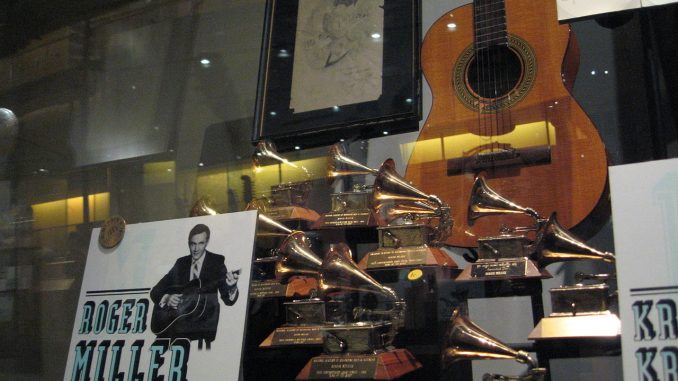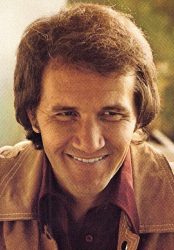
A wayward genius who hid a tough life behind an ability to raise a laugh.

Roger Miller often gets dismissed as a novelty songwriter but such a simple view derides the intelligence of one of the best songwriters the state of Oklahoma ever produced. Yes, there was the tweeness of ‘England Swings’ and the cheesy but fun humour of ‘Dang Me’ but there was also the superb storytelling of, probably his best known song, ‘King of the Road’. That song alone puts him head and shoulders above most songwriters, it’s such an exquisitely observed piece of writing, You can picture this itinerant but savvy man in your mind’s eye, and every verse unlocks a little more detail; he may not have money or social status but he has a life that is his own and is lived on his own terms.
“I know every engineer on every train
All of the children and all of their names
Every handout in every town
Every lock that ain’t locked when no one’s around”
Miller had a real talent for telling stories through his songs and it was this talent that made him a much sought after songwriter long before his own success as a performer.
Born in Fort Worth, Texas, in 1936, his father died when he was just a year old and he was sent to live with an aunt and uncle on their farm in Erick, Oklahoma, which is where he grew up. He never really came to terms with his father’s death or the separation from his mother and he had a troubled and lonely childhood. He worked on the farm while getting his basic education in a one-room schoolhouse, listening to the Grand Ole Opry at night and dreaming of becoming a songwriter. Sheb Wooley was married to Miller’s cousin and he would teach him his first guitar chords as well as getting him started as a fiddle player (he would, later, become an accomplished drummer as well), and he started playing small gigs in Oklahoma and Texas. Such was his desperation to write songs that he stole a guitar to do so, turning himself in the next day and opting to join the Army rather than do jail time for the theft. While he was in the Army he joined the Circle A Wranglers, a military band started by Faron Young and, when he quit the Army, he headed to Nashville on the advice of one of his Army sergeants. He was not an immediate success. He auditioned for Chet Atkins but was told to go away and come back when he had more experience; his audition probably wasn’t helped by the fact that, according to stories at the time, in his nervousness, he played and sang his song in two separate keys!
He did eventually start to carve a career for himself as a songwriter and, in 1958, he achieved chart success via a number of recordings of his songs. His first success was with the Ray Price cover of his song ‘Invitation to the Blues’, which made it to number 3 on the country charts. Next up was a number 9 spot for Faron Young’s cover of ‘That’s the Way I Feel’ but it was the third of his songs released that year, Jim Reeves’ recording of ‘Billy Bayou’, that gave Miller a first number 1 country hit. In many ways, Miller was a successful Nashville songwriter despite the fact that he wasn’t really a country songwriter. Miller had a talent for tapping into a number of genres to build his songs; in fact, you could describe him as an early Americana songwriter, bringing together different genres in the way he did, and his songs would often incorporate aspects of blues, folk, pop, and vaudeville in the way they were constructed and in the stories they told. It was that lack of immediately obvious musical identity that prevented Miller being properly appreciated as a writer at that time. Willie Nelson famously commented that “Roger never did get the recognition for being the writer that he really was.” Prior to breaking through as a songwriter, Miller had stints as a fiddle player in Minnie Pearl’s band and a job as a singing ‘bellhop’ at Nashville’s Andrew Jackson Hotel but, when he married and became a father for the first time, he gave it all up for a while and moved to Amarillo, Texas, where he took a job as a fireman. When the Fire Department suggested he might be better suited in another career, he returned to Nashville and resumed his work in music, which is when things started to happen for him. After his songs started to make an impact he was signed up by Decca Records, initially, where he scored a couple of minor hits, before getting that second chance with Chet Atkins at RCA and finally breaking into the upper reaches of the charts in his own right, with ‘When Two Worlds Collide’, a song he had co-written with Bill Anderson. Miller always found it difficult to settle with anything, a situation not improved by his increasing use of amphetamines, which were the drug of choice at that time and were very popular on the country music scene, where many performers were trying to fit too much living into too little time, juggling touring, recording and family life around the increasing demands of the Music City lifestyle. Once his success had been achieved Miller embraced the party life in a big way, losing his first wife and his recording contract along the way. Soon after this is when he started to pen the novelty songs and MOR hits he would become more known for. They gave him the crossover success he wanted and a raised profile as a performer, leading to his own TV show on NBC and, subsequently, to opportunities for acting work. At the height of his songwriting success, Miller penned hits for artists as diverse as George Jones, Andy Williams, Kitty Wells, and Del Shannon, along with a host of others.
In addition to his Nashville songwriting, he would write songs for the Disney animated film ‘Robin Hood’, where he also voiced the minstrel rooster, Allan-a-Dale and would go on to write the score for Broadway musical ‘Big River’, a theatre production based on Mark Twain’s ‘Adventures of Huckleberry Finn’. His last successful song was one he co-wrote with Dwight Yoakam for Yoakam’s ‘If There Was A Way’ album (1990), ‘It Only Hurts When I Cry’.
Roger Miller was a larger-than-life character who was successful in so many aspects of a long and varied career, but who had difficulty committing himself to any one direction and almost certainly missed out on the appreciation he deserved because of what often appeared to be his dilettante approach to his work, but his awards and achievements paint a more accurate reflection of his abilities. He received no less than 11 Grammy Awards, including Best Country Song (twice), Best Country Vocal Performance, Best Contemporary Vocal Performance, and Best Contemporary Song. He won a Tony Award for his score for ‘Big River’. He was inducted into the Nashville Songwriter’s Hall of Fame in 1973 and the Country Music Hall of Fame in 1995 (3 years after his death). A lifelong smoker, he was diagnosed with Lung Cancer and died in 1992 at the age of 56. It was the loss of a great talent.
In recent years there has been something of a reappraisal of Miller’s work and many are starting to realise just what a talented writer he was. The Canadian songwriter, Mathias Kom, in partnership with New York musician and performance artist, Toby Goodshank, has recently released an album of Miller covers called, appropriately, ‘Miller Time’. Kom cites Miller’s ability to write songs that appeared deceptively simple and occupied the “nebulous space between laughter and tears” as a major influence on his own songwriting.
If you’ve always dismissed Roger Miller as just a singer, and writer, of novelty comedic songs, I’d urge you to take a little time and listen to his songs in more detail. This was a man who understood what constitutes a good song, both his own and other people’s (Miller was the first person to cover ‘Me And Bobby McGee’, by then unknown writer Kris Kristofferson), and wrote many songs that have more than stood the test of time. Miller deserves to be recognised as one of the greats.



There’s a fine tribute album called King of the Road. Two CDs with lots of great artists. Well worth picking up.